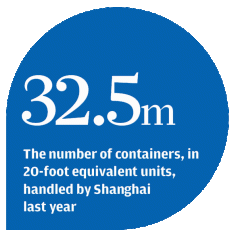
New | 'Shanghai zone needs to focus on shipping'
Loosened customs procedures in the area will enable shipping firms to ride a boom in the manufacturing sector, an industry player says
Xiong Hao, a senior executive at a Shanghai shipping firm, doubts whether the city's proposed free-trade zone has what it takes to make it a world-class trading hub.
"The officials want to bite off more than they can chew," Xiong told the . "They don't seem to understand the role of a free-trade zone and it doesn't make sense to me that the financial sector, rather than trade and shipping, is given priority."
The mainland's commercial sector initially embraced the plan for a free-trade zone with hopes of establishing a mini-Hong Kong territory exempt from custom intervention. But concerns have since grown that the development plan amounts to no more than a renewed effort to transform Shanghai into a global financial centre.
Beijing and local authorities have pledged to make the yuan fully convertible in the free-trade zone, which will initially cover about 30 square kilometres. They have stressed that the zone will be distinct from counterparts around the world, with a focus on financial liberalisation within the area.
"But the manufacturing sector should be the backbone of an economy," said Xiong, an assistant general manager at Shanghai Jump International Shipping. "It is advisable for the government to give tremendous support to the manufacturing and commodity trading sectors by making the most of the policies in the free-trade zone."
Beijing has yet to unveil detailed operating guidelines covering the trial run of the zone, which was officially launched at the end of September, and until now all eyes have been on what financial institutions registered in the zone may be allowed to do.
But Xiong and other shipping industry officials have already envisioned huge opportunities arising from loosened customs intervention, and they believe the sector should be among the top beneficiaries of the zone.
"The Yangshan deep-water port could take a leap forward based on the free-trade zone policies, giving Shanghai a big boost to establish an international shipping centre," said Liu Wei, a professor at the Shanghai Maritime University. "Great changes will take place should the customs authority really relinquish its supervisory role."
The Yangshan Port is a bonded area where import tariffs are not imposed unless the goods are shipped on to other areas, and it is regarded as having the world's best facilities. But until now customs procedures have proved to be a major stumbling block to its development into a major international transshipment hub.
Shanghai handled 32.5 million 20-foot equivalent units (teu) last year, retaining the title of the world's busiest container port for a third year. But only 5.5 per cent of the cargos fell into the category of international transshipment.
In Hong Kong, international transshipments accounted for more than 50 per cent of its container throughput.
"A free flow of cargos would be achieved at the free-trade zone and would eventually help Shanghai handle more international transshipments," Liu said. "All the goods inside the zone are supposed to be exempt from local custom procedures and oversights, and the logistics services will be given free play to quicken cargo flows."
Under the blueprint endorsed by Beijing, a 14 square kilometre area at the Yangshan Port is earmarked for the free-trade zone, which is aimed at bolstering the growth of the shipping industry.
Analysts said that was not big enough to ensure its success.
About half of the 14 square kilometres is in Lingang New City, which is connected with the Yangshan islands through the 32.5km cross-sea Donghai Bridge.
"Lingang has a huge potential to become a regional manufacturing base," said Lu Ming, an agent with Shanghai Ocean Shipping Agency. "A big free-trade zone area at Lingang would attract billions of dollars of investment to set up production bases there. Manufacturers can process goods for both the mainland and foreign markets."

The mainland is pushing the notion that locally made products should rise up the value chain to maintain the rapid growth of the economy, after a strengthening yuan and rising labour costs have dented the country's role as the world's manufacturing hub.
"Going back to basics is important," said Xiong. "The free-trade zone can technically help China to recover the lost ground in manufacturing.
"What's the point of focusing on finance while putting shipping and trade aside?"

